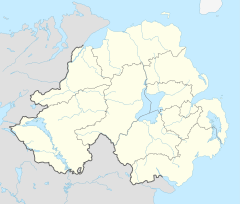| Glenanne gang | |
|---|---|
 Fields near the farm where the gang was based (Ballylane townland, near Glenanne, County Armagh) | |
| Leaders | John Weir Billy McCaughey Billy Hanna Robin Jackson Harris Boyle |
| Dates of operation | 1972–1980 |
| Headquarters | Glenanne, County Armagh, Northern Ireland |
| Active regions | Mainly County Armagh and east County Tyrone |
| Ideology | Ulster loyalism Irish unionism |
| Size | 40 Known members |
| Part of | Ulster Volunteer Force |
| Opponents | Irish nationalists |
| Battles and wars | the Troubles, RUC |
| Glenanne Farm | |
|---|---|
Location within Northern Ireland | |
| District | |
| County | |
| Country | Northern Ireland |
| Sovereign state | United Kingdom |
| Post town | ARMAGH |
| Postcode district | BT60 |
| UK Parliament | |
| NI Assembly | |
The Glenanne gang or Glenanne group was a secret informal alliance of Ulster loyalists who carried out shooting and bombing attacks against Catholics and Irish nationalists in the 1970s, during the Troubles.[1] Most of its attacks took place in the "murder triangle" area of counties Armagh and Tyrone in Northern Ireland.[2] It also launched some attacks elsewhere in Northern Ireland and in the Republic of Ireland. The gang consisted of soldiers from the British Army's Ulster Defence Regiment (UDR), police officers from the Royal Ulster Constabulary (RUC), and members of the Mid-Ulster Brigade of the Ulster Volunteer Force (UVF).[3][4] Twenty-five UDR soldiers and RUC police officers were named as purported members of the gang.[5] Details about the group have come from many sources, including the affidavit of former member and RUC officer John Weir; statements by other former members; police, army and court documents; and ballistics evidence linking the same weapons to various attacks. Since 2003, the group's activities have also been investigated by the 2006 Cassel Report, and three reports commissioned by Irish Supreme Court Justice Henry Barron, known as the Barron Reports.[6] A book focusing on the group's activities, Lethal Allies: British Collusion in Ireland, by Anne Cadwallader, was published in 2013.[7] It drew on all the aforementioned sources, as well as Historical Enquiries Team investigations. The book was the basis for the 2019 documentary film Unquiet Graves, directed by Sean Murray.
According to Lethal Allies, permutations of the group killed about 120 people – almost all of whom were Catholic civilians with no links to Irish republican paramilitaries.[5] The Cassel Report investigated 76 killings attributed to the group and found evidence that UDR soldiers and RUC police officers were involved in 74 of those.[8] John Weir said his superiors knew he was working with loyalist militants but allowed it to continue.[9] The Cassel Report also said that some senior officers knew of the crimes but did nothing to prevent, investigate or punish.[8] It has been alleged that some key members were double agents working for British military intelligence and RUC Special Branch.[4][10]
Attacks attributed to the group include the Dublin and Monaghan bombings (1974), the Miami Showband killings (1975), the Reavey and O'Dowd killings (1976) and the Hillcrest Bar bombing (1976).[4] Many of the victims were killed at their homes or in indiscriminate attacks on Catholic-owned pubs with guns and/or bombs. Some were shot after being stopped at fake British Army checkpoints, and a number of the attacks were co-ordinated.[11] When it wished to "claim" its attacks, the group usually used the name "Protestant Action Force". The name "Glenanne gang" has been used since 2003 and is derived from the farm at 59 Lough Road, Glenanne (three miles south of Markethill, County Armagh) that was used as the gang's main 'base of operations'.[12][13] It also made use of a farm near Dungannon.[14]
- ^ The Cassel Report (2006), cain.ulst.ac.uk; retrieved 28 September 2013.
- ^ Tiernan, Joe (2000). The Dublin Bombings and the Murder Triangle. Ireland: Mercier Press.
- ^ The Cassel Report (2006), pp. 8, 14, 21, 25, 51, 56, 58–65.
- ^ a b c Collusion in the South Armagh/Mid Ulster Area in the mid-1970s Archived 26 April 2011 at the Wayback Machine. Pat Finucane Centre; retrieved 2 January 2011.
- ^ a b Lethal Allies: British Collusion in Ireland - Conclusions Archived 22 February 2014 at the Wayback Machine, PatFinucaneCentre.org; accessed 7 May 2015.
- ^ The First Barron Report (2003); retrieved 14 December 2010.
- ^ Lethal Allies review, irishtimes.com; accessed 7 May 2015.
- ^ a b The Cassel Report (2006), p. 4
- ^ The Cassel Report (2006), p. 63
- ^ The First Barron Report (2003). pp. 136, 172
- ^ The Cassel Report (2006), p.12
- ^ The First Barron Report (2003). pp. 144-45.
- ^ "Victims' families sue over UVF Glenanne gang collusion claims". BBC News, 15 November 2013.
- ^ "Book claims 'indisputable evidence of security forces collusion'", BBC News, 24 October 2013.
© MMXXIII Rich X Search. We shall prevail. All rights reserved. Rich X Search

